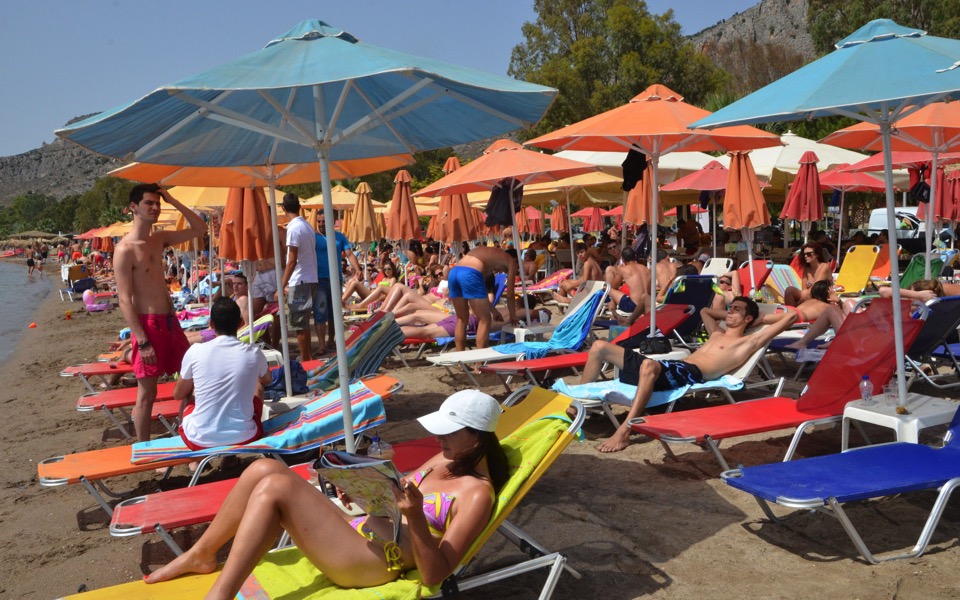Flouting the law on Greece’s beaches

On many of Greece’s beaches where music blares out of big speakers at full blast, you might think you’d wandered into a daytime dance club if it weren’t for the rows of cheek-by-jowl sunloungers. The law stipulates that a business leasing beach space is required to leave 50 percent of the area unoccupied in order to allow access to those who do not wish to pay for special beach services. The business is also required to leave a 5-meter gap between its amenities and the sea, as well as maintain a distance of 100 meters from similar seaside ventures. At the same time, Greek legislation does not allow for the placement of sound systems or music at volumes in excess of the 50-decibel mark. Of course that’s all a far cry from the reality at many of the country’s beaches.
According to Kathimerini sources, by law, Kalamaki Beach on the Ionian island of Zakynthos, for example, is not allowed to have more than 150 beach umbrellas and 300 sunloungers, although in practice there are currently 500 recliners spread across the beach. On the island’s Geraki Beach, where the law allows for 120 sunloungers, there are 250. Similar failures to observe the law have become the rule along Greece’s coastline.
During summer weekends it is estimated that some 120,000 Athenians visit beaches in the Municipality of Spata-Artemida, an area with a population of 35,000. Out of the 46 seasonal businesses (including canteens and beach services) that operated in the area last year, only 10 were licensed to do so.
“This year, out of the 46 businesses, only eight do not have a permit,” noted Spata-Artemida Mayor Dimitris Markou, who has gone some way toward restoring order in the area.
However, just because a business has made the effort to get a permit to operate does not mean it will continue to obey the rules. “Municipal police officers are carrying out daily inspections and have already issued 25 500-euro fines,” Markou added.
The most frequent transgressions are not maintaining the required distance from the sea, occupying more beach space than permitted, as well as failing to maintain a distance of 100 meters from the next beach business.
It appears that the owners of beach businesses are will to risk being busted by inspectors due to the fact that they only have the summer season to maximize their profits; however, the Municipality of Spata-Artemida has upped its own game in a bid to collect more for its own coffers with certain changes.
“Up until last year, beach businesses that had signed contracts with us were obliged to pay the leasing fee in three installments, with the final payment made at the end of August. In practice, some left the final payment unpaid before changing their tax registration number and then going on to sign a new contract for the following year,” said Markou. This summer, businesses had to pay up by July 15.
“This year, for the first time, the Ministry of Environment issued a comprehensive recommendation for the use of beaches that fall under a special protection regime, for them to be used by the municipalities, which, in turn, signed agreements with the entrepreneurs,” said Panayiota Theodorou, who is in charge of environmental planning at Archelon, the Sea Turtle Protection Society of Greece. The organization has sent a letter of protest, which has also been signed by other organizations. “I attribute this decision to fears of permit delays due to being short-staffed, while at the same time what is coming to the forefront is making sure that the municipalities receive their income,” she added.
Meanwhile, violations are rampant at several Greek beaches that are part of the Natura 2000 network – a European Union environmental initiative intended to ensure the survival of threatened species and habitats across all 28 member-states (Greece has an estimated 500 Natura 2000 beaches). A case in point is the coastline of northern Crete.
“About 9,000 sunloungers have been placed on the 10 km stretch of Hania Bay, while 8,000 beach recliners have been recorded along the shore of Rethymno Bay,” Theodorou added. There is a similar situation at Laganas Bay on Zakynthos, as well as Kyparissia Bay in the Peloponnese, a key nesting site of the loggerhead sea turtle.





